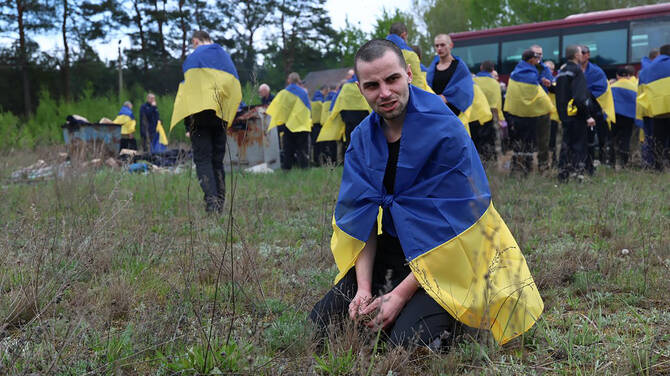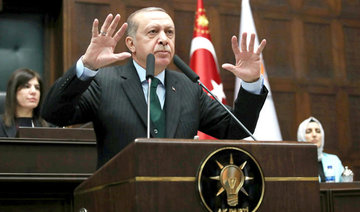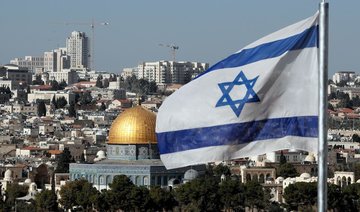WASHINGTON: President Donald Trump will announce on Wednesday that the US recognizes Jerusalem as the capital of Israel and will move its embassy there, breaking with longtime US policy and potentially stirring unrest.
Despite warnings from Western and Arab allies, Trump in a 1pm White House speech will direct the State Department to begin looking for a site for an embassy in Jerusalem as part of what is expected to be a years-long process of relocating diplomatic operations from Tel Aviv.
Trump is to sign a national security waiver delaying a move of the embassy, since the US does not have an embassy structure in Jerusalem to move into. A senior administration official said it could take three to four years to build an embassy.
Still, Trump’s decision, a core promise of his campaign last year, will upend decades of American policy that has seen the status of Jerusalem as part of a two-state solution for Israelis and Palestinians, who want East Jerusalem as their capital.
Washington’s Middle East allies all warned against the dangerous repercussions of his decision when Trump spoke to them on Tuesday.
“The president believes this is a recognition of reality,” said one official, who briefed reporters on Tuesday about the announcement. “We’re going forward on the basis of a truth that is undeniable. It’s just a fact.”
Senior Trump administration officials said Trump’s decision was not intended to tip the scale in Israel’s favor and that agreeing on the final status of Jerusalem would remain a central part of any peace deal between Israel and the Palestinians.
In defending the decision, the officials said Trump was basically reflecting a fundamental truth: That Jerusalem is the seat of the Israeli government and should be recognized as such.
The Palestinians have said the move would mean the “kiss of death” to the two-state solution.
The political benefits for Trump are unclear. The decision will thrill Republican conservatives and evangelical Christians who make up a large share of his political base.
But it will complicate Trump’s desire for a more stable Middle East and Israel-Palestinian peace and arouse tensions. Past presidents have put off such a move.
The mere hint of his decision to move the embassy in the future set off alarm bells around the Middle East, raising the prospect of violence.
“Our Palestinian people everywhere will not allow this conspiracy to pass, and their options are open in defending their land and their sacred places,” said Hamas chief Ismail Haniyeh.
Islamist militant groups such as Al-Qaeda, Hamas and Hezbollah have in the past tried to exploit Muslim sensitivities over Jerusalem to stoke anti-Israel and anti-US sentiment.
The decision comes as Trump’s senior adviser and son-in-law, Jared Kushner, leads a relatively quiet effort to restart long-stalled peace efforts in the region, with little in the way of tangible progress thus far.
“The president will reiterate how committed he is to peace. While we understand how some parties might react, we are still working on our plan which is not yet ready. We have time to get it right and see how people feel after this news is processed over the next period of time,” one senior official said.
Trump spoke to Palestinian President Mahmoud Abbas, Israeli Prime Minister Benjamin Netanyahu, Jordan’s King Abdullah and Saudi King Salman to inform them of his decision.
The Jordanian king “affirmed that the decision will have serious implications that will undermine efforts to resume the peace process and will provoke Muslims and Christians alike,” said a statement from his office.
Israel captured Arab East Jerusalem in the 1967 Middle East war and later annexed it. The international community does not recognize Israeli sovereignty over the entire city, home to sites holy to the Muslim, Jewish and Christian religions.
“We have always regarded Jerusalem as a final-status issue that must be resolved through direct negotiations between the two parties based on relevant Security Council resolutions,” UN spokesman Stephane Dujarric told reporters.
No other country has its embassy in Jerusalem.
Trump has weighted US policy toward Israel since taking office in January, considering the Jewish state a strong ally in a volatile part of the world.
Still, deliberations over the status of Jerusalem were tense. Vice President Mike Pence and David Friedman, US ambassador to Israel, pushed hard for both recognition and embassy relocation, while Secretary of State Rex Tillerson and Defense Secretary Jim Mattis opposed the move from Tel Aviv, according to other US officials who spoke on condition of anonymity.
An impatient Trump finally weighed in, telling aides last week he wanted to keep his campaign promise.
Abbas warned Trump of the “dangerous consequences” that moving the embassy would have for peace efforts and regional stability, Abbas spokesman Nabil Abu Rdainah said.
But Trump assured Abbas that he remained committed to facilitating an Israeli-Palestinian peace deal, one US official said.
In break with decades of US policy, Trump to recognize Jerusalem as Israel’s capital
In break with decades of US policy, Trump to recognize Jerusalem as Israel’s capital

Gaza rescuers say 31 killed in Israeli strikes on school sheltering displaced

GAZA CITY: Gaza’s civil defense agency said Wednesday that Israeli strikes on a school sheltering displaced people in the war-ravaged Palestinian territory killed 31 people and wounded dozens, with Israel saying it had targeted Hamas militants.
Gaza civil defense media officer Ahmad Radwan told AFP that a total of 31 people were killed and dozens more wounded in Israeli strikes “on a school sheltering displaced persons” in the Bureij refugee camp in the center of the Gaza Strip.
The Israeli military meanwhile said in a statement that its forces had struck a “Hamas command and control center in the central Gaza Strip” which was used “to store weapons.”
The strikes came as Israel drew international condemnation on Tuesday over its plans for an expanded Gaza offensive, as the country’s far-right finance minister called for the Palestinian territory to be “destroyed.”
Nearly all of Gaza’s 2.4 million people have been displaced at least once during the war, sparked by Hamas’s October 7, 2023 attack on Israel.
On Tuesday, Hamas dismissed as pointless ceasefire talks with Israel, accusing it of waging a “hunger war” on Gaza.
Israel’s military resumed its offensive on the Gaza Strip in March, ending a two-month truce that saw a surge in aid into the territory and the release of hostages in exchange for Palestinian prisoners held by Israel.
Gaza aid dries up as Israeli blockade enters a third month

- The current blockade has lasted longer than any previous Israeli halt in aid to Gaza since the Israel-Hamas war began
JERUSALEM: Israel has blockaded all entrances to the Gaza Strip since March.
While pummeling the strip with airstrikes, it has banned any food, water, shelter or medication from being trucked into the Palestinian territory, where the UN says the vast majority of the population is reliant on humanitarian aid to survive. Israel says the blockade aims to pressure Hamas to release the hostages it still holds. Of the 59 captives remaining in Gaza, 21 are believed to still be alive, US President Donald Trump said Tuesday, revealing that three had died.
Here’s a look at the humanitarian crisis spiraling in Gaza, through key statistics and charts:
The current blockade has lasted longer than any previous Israeli halt in aid to Gaza since the Israel-Hamas war began. Hamas attacked Israel on Oct. 7, 2023 and Israel froze aid to Gaza for two weeks.
Now, Gaza is entering its third month without supplies. Thousands of trucks queue along the border of the territory, waiting to be let in. Community kitchens are closing down and bakeries are running out of fuel. Families spend hours waiting in line for small portions of rice.
In their desperation, Palestinians have begun scavenging warehouses and stores for anything left. Aid groups report a rise in looting incidents over the last week. At least some have been looted by armed groups.
Meanwhile, Israel is moving forward with plans to seize all of Gaza and to stay in the Palestinian territory for an unspecified amount of time. It says it will expand operations there, defying calls for an immediate renewal of a ceasefire from families whose relatives are still held hostage in Gaza.
Israel’s offensive has displaced more than 90 percent of Gaza’s population and, Palestinian health officials say, killed more than 52,000 people, many of them women and children. Palestinian officials do not distinguish between combatants and civilians in their count.
UAE mediates deal for release of further 410 Russian and Ukrainian prisoners of war

- It is the 15th in a series of UAE-mediated prisoner-swap agreements that have resulted in the release of 4,181 captives in total
LONDON: The UAE has mediated the 15th in a series of agreements between Russia and Ukraine for the release of prisoners of war, as part of its ongoing diplomatic efforts to help resolve the conflict.
Under the latest prisoner-swap deal, 205 Ukrainians and 205 Russians were freed on Tuesday, the Emirates News Agency reported. The Emirati Ministry of Foreign Affairs said a total of 4,181 Russian and Ukrainian captives have now been released as a result of its mediation efforts, the continuing success of which reflects the level of trust Kyiv and Moscow have in the UAE.
The UAE remains determined to find a peaceful resolution to the war in Ukraine, which began in February 2022, and to help ease the humanitarian suffering it has caused, the ministry added.
Lebanon says one killed in Israeli strike on south

- The ministry said in a statement that the “Israeli enemy” strike on Kfar Rumman killed one person and wounded three others
- Israel has continued to launch regular strikes in Lebanon despite the November 27 truce
BEIRUT: Lebanon’s health ministry said an Israeli strike Tuesday on a car in the country’s south killed one person, the latest attack despite a fragile ceasefire between Hezbollah militants and Israel.
The ministry said in a statement that the “Israeli enemy” strike on Kfar Rumman killed one person and wounded three others.
Lebanon’s state-run National News Agency said the car was hit with a “guided missile” on the road linking the town of Kfar Rumman with the nearby city of Nabatieh.
There was no immediate comment from the Israeli military.
Israel has continued to launch regular strikes in Lebanon despite the November 27 truce which sought to halt more than a year of hostilities with Hezbollah including two months of all-out war, with a heavy Israeli bombing campaign and ground incursion.
Under the deal, Hezbollah was to pull its fighters north of Lebanon’s Litani River, some 30 kilometers (20 miles) from the Israeli border, and dismantle any remaining military infrastructure to its south.
Israel was to withdraw all its forces from south Lebanon, but it has kept troops in five positions that it deems “strategic.”
A Lebanese security source told AFP that Hezbollah had withdrawn fighters from south of the Litani and dismantled most of its military infrastructure in that area.
Lebanon says it has respected its commitments and has called on the international community to pressure Israel to end its attacks and withdraw from the five border positions.
Huge dust storm sweeps into Iran, affecting millions

- State television urged people to remain inside and wear face masks if they had to go out
TEHRAN: Iranian authorities ordered schools and offices closed in seven western provinces Tuesday as a dust storm swept in from neighboring Iraq, with around 13 million people told to stay indoors.
Khuzestan, Kermanshah, Ilam and Kurdistan provinces were all affected, and state television cited local officials as blaming the closures on high levels of accumulated dust.
Government and private offices also shut in several provinces including Kermanshah and Ilam, as well as Khuzestan in the southwest.
Zanjan in the northeast and Bushehr in the south were also hit.
Bushehr, nearly 1,100 km south of Tehran, was given an Air Quality Index of 108 on Tuesday, rated “poor for sensitive groups.”
That figure is more than four times higher than the concentration of air microparticles deemed acceptable by the World Health Organization.
Iran’s meteorological authorities said the conditions were caused by “the movement of a large mass of dust from Iraq toward western Iran.”
State television reported low visibility in some areas and urged people to remain inside and wear face masks if they had to go out.
Last month, a similar dust storm in Iraq grounded flights and sent thousands of people to hospital with breathing problems.
On Monday, Iran’s IRNA state news agency said more than 240 people in Khuzestan province had been treated for respiratory issues because of the dust.
A spokesperson for the emergency services also told Tasnim news agency on Tuesday that nine people had died as a result of storms in Iran over the past seven days, ending on Monday.
“Four of the deaths were caused by strong winds and falling objects, and five were caused by lightning strikes,” it added.






















